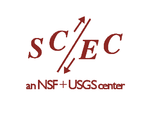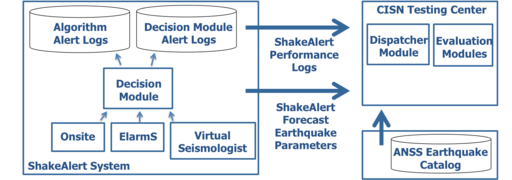Difference between revisions of "CISN Testing Center"
| (29 intermediate revisions by the same user not shown) | |||
| Line 1: | Line 1: | ||
| + | [[Image:SCEC_NSF-USGS-words_logom.png|left|150px]][[Image:CISNlogos.png|right|250px]] | ||
| + | [[Image:Swiss_Seismological_Service-Logo.png|right|40px]] | ||
| + | [[Image:usgs-logo-color.jpg|right|150px]] | ||
| − | CTC | + | The CISN Testing Center (CTC) consists of scientific analysis software, CISN EEW algorithm performance reports, and earthquake observational data. |
| + | == CISN ShakeAlert Testing Center Results == | ||
| − | + | Currently CTC ShakeAlert performance evaluations are produced by nightly automated processing. CTC ShakeAlert testing results are collected on the following entry: | |
| + | *[[CTC Results]] | ||
| + | *[http://hypocenter.usc.edu/research/CTC/ShakeAlert_PS_Overview_v5.pdf Discussion of ShakeAlert Testing Methodology] (3.4MB pdf) | ||
| − | CTC | + | == CTC Design Goals == |
| − | |||
| − | |||
| − | |||
| − | |||
| − | + | CTC is designed to meet scientific forecast testing goals described in Schorlemmer Gerstenberger (2007): | |
| + | *Transparency | ||
| + | *Controlled Environment | ||
| + | *Comparability | ||
| + | *Reproducibility | ||
| − | + | '''Transparency''' | |
| − | |||
| − | |||
| − | + | For transparency, all CTC evaluation software is open-source and accessible to CISN researchers. Also, CTC performance summaries are identified with a CTC software version. When a CTC results is presented, all input data sets used in the calculation, all authorized data sets (observational data), and all source code is accessible to researchers ensuring that all calculations can be checked. | |
| + | '''Controlled Environment''' | ||
| − | == | + | For controlled environment, CTC evaluation summaries are based on EEW forecasts created during earthquake processing and transmitted to the CTC testing center with no human intervention. Performance summaries are produced by CTC testing group, independent of algorithm developers. Observational data used is obtained from approved and authorized data sources (ANSS Catalog and ShakeMap). |
| + | |||
| + | '''Comparability''' | ||
| + | |||
| + | For comparability, CTC evaluation summaries integrate information from multiple algorithms. CTC processing combines information from multiple algorithms producing comparable performance information for different algorithms for the same earthquake. | ||
| + | |||
| + | '''Reproducibility''' | ||
| + | |||
| + | For reproducibility, CTC results can be reproduced by retrieving the CTC software version used to produced the summaries. The CTC software can be run interactively, which enables any user to reproduce CTC results. | ||
| + | |||
| + | == CTC Implementation Approach == | ||
| + | |||
| + | As of 1 August 2013, CTC consists of two elements, (1) an automated data processing framework based on the CSEP software that retrieves observational data for use in evaluations, and (2) processing software that parses CISN Algorithm performance reports and matches the EEW event and site forecast information against ANSS catalog and ShakeMap ground motion observations. | ||
| + | |||
| + | [[Image:ShakeAlert.png|512px|thumbnail|right|Fig 1: CISN EEW system performance evaluations compare EEW forecasts to ANSS and ShakeMap observational data to produce EEW performance summaries. (Image Credit: Philip Maechling) ]] | ||
| + | |||
| + | *[http://northridge.usc.edu/trac/eew CTC Software Trac] | ||
== See Also == | == See Also == | ||
| + | |||
| + | *[[CTC Results]] | ||
| + | *[[Earthquake Early Warning]] | ||
| + | *[[ShakeAlert]] | ||
| + | |||
| + | == References == | ||
| + | *Bӧse, M., Allen, R., Brown, H., Cua, G., Fischer, M., Hauksson, E., Heaton, T., Hellweg, M., Liukis, M., Neuhauser, D., Maechling, P. & CISN EEW Group, 2013: CISN ShakeAlert: An Earthquake Early Warning Demonstration System for California, in: F. Wenzel and J. Zschau(eds.) Early Warning for Geological Disasters - Scientific Methods and Current Practice; ISBN: 978-3-642-12232-3, Springer Berlin Heidelberg New York | ||
| + | * D. Schorlemmer and M. C. Gerstenberger Seismological Research Letters, Vol. 78, No. 1, 30-36, 2007. | ||
Latest revision as of 19:31, 6 September 2013
The CISN Testing Center (CTC) consists of scientific analysis software, CISN EEW algorithm performance reports, and earthquake observational data.
Contents
CISN ShakeAlert Testing Center Results
Currently CTC ShakeAlert performance evaluations are produced by nightly automated processing. CTC ShakeAlert testing results are collected on the following entry:
CTC Design Goals
CTC is designed to meet scientific forecast testing goals described in Schorlemmer Gerstenberger (2007):
- Transparency
- Controlled Environment
- Comparability
- Reproducibility
Transparency
For transparency, all CTC evaluation software is open-source and accessible to CISN researchers. Also, CTC performance summaries are identified with a CTC software version. When a CTC results is presented, all input data sets used in the calculation, all authorized data sets (observational data), and all source code is accessible to researchers ensuring that all calculations can be checked.
Controlled Environment
For controlled environment, CTC evaluation summaries are based on EEW forecasts created during earthquake processing and transmitted to the CTC testing center with no human intervention. Performance summaries are produced by CTC testing group, independent of algorithm developers. Observational data used is obtained from approved and authorized data sources (ANSS Catalog and ShakeMap).
Comparability
For comparability, CTC evaluation summaries integrate information from multiple algorithms. CTC processing combines information from multiple algorithms producing comparable performance information for different algorithms for the same earthquake.
Reproducibility
For reproducibility, CTC results can be reproduced by retrieving the CTC software version used to produced the summaries. The CTC software can be run interactively, which enables any user to reproduce CTC results.
CTC Implementation Approach
As of 1 August 2013, CTC consists of two elements, (1) an automated data processing framework based on the CSEP software that retrieves observational data for use in evaluations, and (2) processing software that parses CISN Algorithm performance reports and matches the EEW event and site forecast information against ANSS catalog and ShakeMap ground motion observations.
See Also
References
- Bӧse, M., Allen, R., Brown, H., Cua, G., Fischer, M., Hauksson, E., Heaton, T., Hellweg, M., Liukis, M., Neuhauser, D., Maechling, P. & CISN EEW Group, 2013: CISN ShakeAlert: An Earthquake Early Warning Demonstration System for California, in: F. Wenzel and J. Zschau(eds.) Early Warning for Geological Disasters - Scientific Methods and Current Practice; ISBN: 978-3-642-12232-3, Springer Berlin Heidelberg New York
- D. Schorlemmer and M. C. Gerstenberger Seismological Research Letters, Vol. 78, No. 1, 30-36, 2007.



